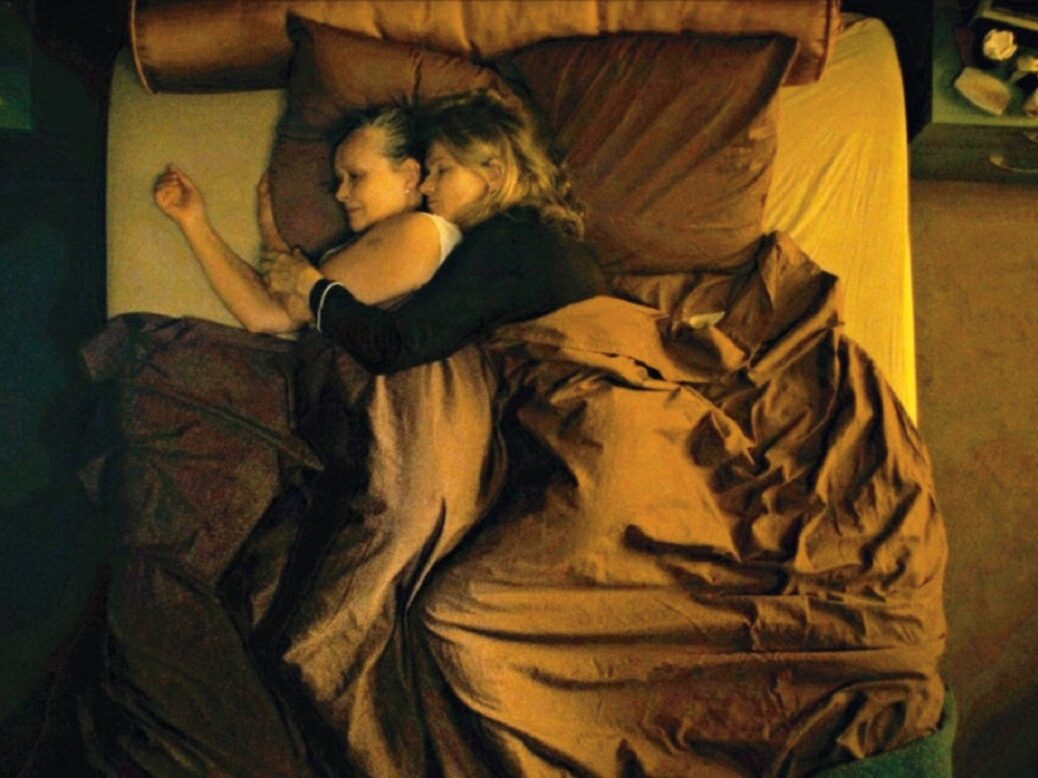
Uphill work, making cinema without youth, youthful beauty, youthful desirability. Two of Us (Deux), the feature debut of Filippo Meneghetti, an Italian director working in France, tackles the challenge head on.
Madeleine (Martine Chevallier of the Comédie-Française) and Nina (Barbara Sukowa), both in their seventies, are neighbours and, secretly, lovers in an unnamed town in the south of France. Madeleine’s apartment is richly furnished with the memorabilia of family life. Widowed, she has a grumpy, grown-up son, a daughter, Anne (Léa Drucker), and a grandson – and they know nothing of her relationship with Nina.
Across the hall, Nina’s apartment is spartanly furnished, modern, scarcely a home at all. It emerges she moved there three years ago, in order to be with her beloved “Mado”, the pair having met many years before in Rome, where Nina, originally from Berlin, worked as a tour guide. Now the couple plan to sell one of the apartments and move to Italy together, reinventing themselves openly as a couple – but first Madeleine must come out at last to her children, thus revealing that her relationship with their father was a lie, and perhaps risking a homophobic reaction too. She promises Nina she will announce it at a family lunch – but her nerve fails her again. Nina is furious.
So upset is Madeleine, she suffers a seizure and loses the ability to speak. Nina wants to be with her but has no acknowledged part in her life. Now their roles are reversed: Nina must disguise their relationship, while Madeleine, in so far as she can express it, now wants nothing but for their life together to be open knowledge. Chevallier and Sukowa work brilliantly well together, partly perhaps because they come from such different traditions – Sukowa is a Rainer Werner Fassbinder favourite, so adaptable and expressive in film and television with only a single appearance on stage; Chevallier’s career has been dominated by classic roles in the theatre – and here must reverse the way each of them perform and project.
[See also: Despite its unexpected director, Black Widow is predictable Marvel fare]
The romantic and domestic frustrations of two retired women in their seventies is not the most obviously suspenseful, high-concept premise for a movie, but Meneghetti makes the story remarkably compelling, by the adroit adaptation of all sorts of thriller-like devices – night-time intrusions, revelations of identity, fish-eye lens spying across the corridor, an unattended pan left to burn, a washing machine thrumming ominously, a dream sequence… There’s even a fine Mrs Danvers-ish turn by Muriel Bénazéraf as a live-in carer, at first lumpy and sullen, then threatening.
Two of Us (the French entry for Best International Film at the Oscars this year) is also notably well-framed in every shot, thoughtfully composed, involving in all its camera moves – a treat for the eye. It is utterly unlike all those films where, if you once begin to ask “Why are we seeing that like this?”, the answer soon comes: no particular reason. It is tactful and affectionate in the way it portrays these beautiful but ageing women, not sparing us the wrinkles, loosening jawlines and coagulating ankles, showing faces in close-up without much make-up, but always with intimacy rather than any objectifying gaze.
For Meneghetti’s stated purpose here is to protest against the way we live in a society dominated by youth, fetishising perfect bodies: the world delineated with the most brutal clarity by Michel Houellebecq, say.
“You can still be beautiful and charming and live your life fully when you are in your seventies,” Meneghetti has said – even hoping he will be like that himself when the time comes. “I mean, I don’t know yet, because I’m not at that age.” He began to develop this project, in fact, when he was just 33.
[See also: Covid-19 and the decline of the cinema blockbuster]
Two of Us ends, if not wholly optimistically, then at least with a romantic gesture. The film that it must be compared with, however, is Michael Haneke’s 2012 terror masterpiece about love in old age, Amour, which allows us no escape whatsoever, not the least turning away from anguish and death.
Haneke was 70 when Amour was released. The actors who played the loving couple, Georges and Anne, were Jean-Louis Trintignant, then 81, and Emmanuelle Riva, then 85, both known for their beauty when young (they began their careers with And God Created Woman in 1956, and Hiroshima Mon Amour in 1959, respectively). It is one of the most unyielding films ever made. Haneke – whose only film since, the ironically titled Happy End of 2017, is nothing like as good as this appalling statement – is showing us here, definitively, “age, and the only end of age”.
Two of Us clearly stands in some deliberate relation to Amour, possibly even to some extent derives from it – but it’s a softening, a soapy indulgence in wish-fulfilment, in comparison. Alternatively, despite the subject, you could say it exhibits the endearing hopefulness of youth.
“Two of Us” is in cinemas and on Curzon Home Cinema from 16 July
[See also: Thomas Vinterberg’s Another Round: festive male boozing]
This article appears in the 14 Jul 2021 issue of the New Statesman, Apple vs Facebook




